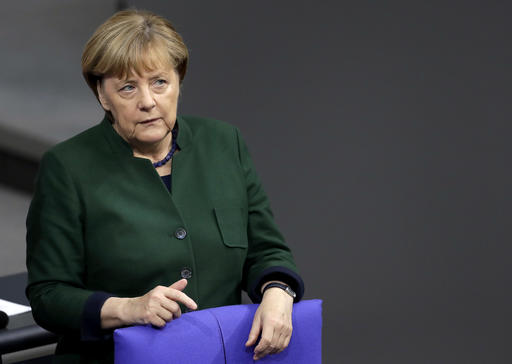
German Chancellor Angela Merkel attends a budget debate as part of a meeting of the German Federal Parliament, Bundestag, at the Reichstag building in Berlin, Germany, Wednesday, Nov. 23, 2016. AP Photo
BERLIN—A pastor’s daughter raised behind the Iron Curtain, Germany’s Angela Merkel has defied predictions to become Europe’s most powerful politician and, some argue, the new “leader of the free world”.
As the West is badly shaken by Donald Trump’s White House win, the Brexit vote and the rise of shrill populism, many see the pragmatic, no-nonsense chancellor as the last voice of reason on a chaotic global stage.
The unruffled, some say bland, style of the trained physicist has seen Merkel, 62, lead Europe’s top economy through the storms of the eurozone crisis, tensions with Russia and a historic refugee influx.
READ: Merkel takes center stage in EU’s year of crises
During her marathon 11 years in power she has seen world leaders come and go, including George W. Bush, Tony Blair, David Cameron, Jacques Chirac, and soon Barack Obama and Francois Hollande. Next year she will seek another four-year term in office.
Once derided as Europe’s “austerity queen”, she recently earned kudos when she reminded Trump that cooperation must be based on “democracy, freedom and respect for the law and the dignity of man”.
International newspapers declared Merkel the new torch-bearer of liberal democracy, and outgoing US President Obama called her his closest partner saying: “If I were German and I had a vote, I might support her.”
In a signature show of modesty, Merkel waved off the many accolades as “grotesque and absurd”.
Days later, she told her center-right CDU party she was up to the challenge of running again, declaring dutifully that “many people would not be very understanding if I failed to use all of my experience to do my duty for Germany”.
Behind the Wall
With a doctorate in quantum chemistry, Merkel is known for a methodical approach to problem-solving, rather than for soaring oratory or big-vision statements.
Seemingly devoid of vanity and indifferent to the trappings of power, she lives in a Berlin flat with her media-shy scientist husband Joachim Sauer, shops in a local supermarket and spends holidays hiking in the Alps.
Germans seem to like it that way, given how past ideologues have plunged the country into catastrophe, and have re-elected “Mutti” (Mummy) twice since 2005.
READ: Germany’s Merkel most powerful woman for 6th year—Forbes
Merkel was born Angela Dorothea Kasner in 1954 in the port city of Hamburg. Weeks later her father, a Lutheran clergyman, moved the family to a small town in the communist East at a time when most people headed the other way.
Biographers say life in a police state taught Merkel to hide her true thoughts behind a poker face.
Like most students, Merkel joined the state’s socialist youth movement, but she rejected an offer to inform for the Stasi secret police while also staying clear of risky pro-democracy activism.
A top student, she excelled in Russian, which would later help her keep up the dialogue with President Vladimir Putin, who was a KGB officer in Dresden when the Berlin Wall fell in 1989.
During that momentous upheaval, Merkel was working in a Berlin laboratory but quickly joined the nascent group Democratic Awakening. The group merged with the Christian Democrats of then chancellor Helmut Kohl, who fondly if patronizingly dubbed Merkel “my girl”.
Merkel’s mentor was not the last politician to underestimate her and pay the price.
When Kohl became embroiled in a campaign finance scandal in 1999, Merkel openly urged her party to drop the self-declared “old warhorse” — kicking off her meteoric rise as the youngest-ever and first female German chancellor in 2005.
‘Mother Angela’
In a party dominated by Catholic men from south Germany, the twice-married, childless woman from the communist East was and remains an outsider.
As party leader she has remade the Christian Democratic Union, anchoring it in the political center by pushing social policies, abolishing compulsory military service and scrapping nuclear power.
She emerged as Europe’s go-to leader during the sovereign debt crisis, when she was derided as a puritanical “austerity queen” in crisis-wracked southern countries.
At home though, Merkel’s insistence on fiscal discipline soothed the angst of a thrifty populace fearful about its pensions.
Merkel’s image as a reassuring leader was upturned last year when she took the unusually bold step of throwing open German borders to a flood of refugees from Syria, Iraq and other conflict zones.
She won praise from asylum seekers and was portrayed as “Mother Angela” with a nun’s habit by news weekly Der Spiegel.
But the influx also fueled a surge in right-wing populism, angered Merkel’s coalition allies and saw her isolated within the European Union.
A year on, as new arrivals have tapered off, Merkel’s approval ratings have moved back up to around 60 percent.
Despite the political damage, she heads into the 2017 campaign season as the strongest candidate, with no serious rival for the top post or likely challenger in her own conservative ranks.